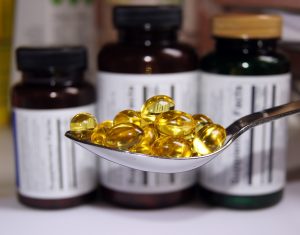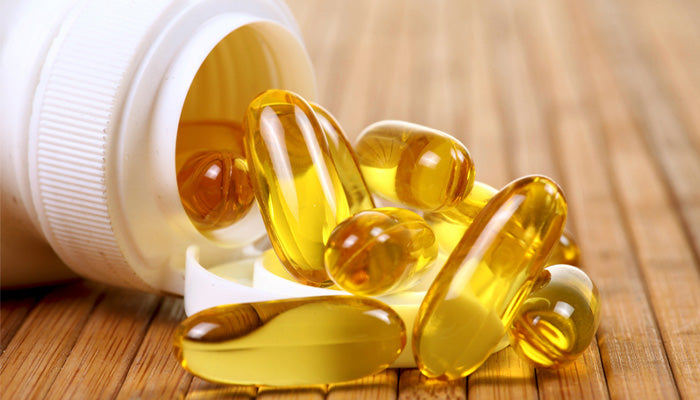Top Sources of Eicosapentaenoic Acid
Eicosapentaenoic acid (EPA) is a crucial omega-3 fatty acid that plays a vital role in maintaining optimal health. As more people become aware of its numerous benefits, the demand for EPA-rich sources has skyrocketed. In this comprehensive guide, we'll explore the top sources of EPA, compare fish oils with plant-based alternatives, and provide insights on choosing the best EPA supplements for your needs.
Fish Oils vs. Plant-Based Alternatives
When it comes to EPA sources, the debate often centers around fish oils and plant-based alternatives. Let's delve into the pros and cons of each:
Fish Oils: The Traditional Powerhouse
Fish oils have long been considered the gold standard for EPA supplementation. Rich in both EPA and DHA (docosahexaenoic acid), they offer a potent combination of omega-3 fatty acids. Some of the best fish sources of EPA include:
- Salmon
- Mackerel
- Sardines
- Anchovies
- Herring
These fatty fish are not only abundant in EPA but also provide additional nutrients like vitamin D and selenium. However, concerns about mercury contamination and overfishing have led some consumers to seek alternatives.

Plant-Based Alternatives: The Rising Stars
For vegetarians, vegans, or those with fish allergies, plant-based EPA sources have emerged as a viable option. While most plant sources don't naturally contain EPA, they can provide alpha-linolenic acid (ALA), which the body can convert to EPA. Some plant-based sources include:
- Algal oil
- Flaxseed oil
- Chia seeds
- Hemp seeds
- Walnuts
Algal oil, derived from microalgae, is particularly noteworthy as it's the only plant-based source that directly provides EPA without the need for conversion. This makes it an excellent option for those seeking a vegan-friendly EPA supplement.

Choosing the Best Eicosapentaenoic Acid Supplement
With myriad EPA supplements flooding the market, selecting the right one can be daunting. Here are some factors to consider when choosing an EPA supplement:
1. Purity and Quality: Choose supplements that undergo third-party testing to verify their purity and potency. Look for trusted certifications from organizations like the International Fish Oil Standards (IFOS) or NSF International, which ensure the product meets rigorous quality and safety standards.
2. EPA Concentration: Check the Vagen EPA content per serving to ensure you're getting an effective dose. Higher concentrations allow you to take fewer capsules to meet your daily needs, offering convenience and potentially reducing the overall cost of supplementation while maintaining the desired health benefits.
3. EPA to DHA Ratio: While both EPA and DHA are beneficial, some research suggests that EPA may be more effective for certain conditions, such as depression and inflammation. Consider supplements with a higher EPA to DHA ratio if you're targeting specific health concerns.
4. Sustainability: When choosing fish oil supplements, prioritize those sourced from sustainable fisheries. Look for the Marine Stewardship Council (MSC) certification, which is a reliable indicator of environmentally responsible sourcing. This ensures that the fish oil is harvested in a way that supports long-term marine ecosystem health, making it a more eco-friendly choice for consumers.
5. Form of Supplement: EPA supplements come in various forms, including softgels, liquids, and powders. Choose a form that fits your lifestyle and preferences. For instance, Vagen EPA powder can be easily mixed into smoothies or beverages, offering a convenient alternative to traditional softgels.

Daily Requirements for Optimal Health
Determining the ideal EPA intake can be complex, as requirements may vary based on individual health status and goals. However, here are some general guidelines:
General Population
The American Heart Association advises consuming at least two servings of fatty fish per week, equating to around 250-500 mg of combined EPA and DHA daily. This intake supports heart health and provides essential omega-3 fatty acids, contributing to overall cardiovascular wellness and helping maintain a balanced, healthy diet.
Specific Health Conditions
For individuals with certain health conditions, higher doses may be beneficial:
- Heart disease: 1000-4000 mg of combined EPA and DHA daily
- Depression: 1000-2000 mg of EPA daily
- Rheumatoid arthritis: 2600 mg of EPA daily
It's crucial to consult with a healthcare professional before starting any new supplement regimen, especially if you have pre-existing health conditions or are taking medications.
Bioavailability Considerations
The bioavailability of EPA can vary depending on its form. Triglyceride-based EPA is typically better absorbed than ethyl ester forms. To further boost absorption, it's beneficial to take EPA supplements with a meal that includes healthy fats, as this helps the body utilize the omega-3s more effectively for optimal health benefits.
Balancing Omega-3 and Omega-6
While focusing on EPA intake, it's also important to consider the overall balance of omega-3 to omega-6 fatty acids in your diet. The typical Western diet is often high in omega-6s, which can promote inflammation when consumed in excess. Aiming for a ratio closer to 1:1 or 1:4 (omega-3: omega-6) may offer optimal health benefits.

Conclusion
Incorporating adequate amounts of EPA into your diet can significantly impact your overall health and well-being. Whether you choose fish oils, plant-based alternatives, or supplements, ensuring a consistent intake of this vital omega-3 fatty acid is crucial. By understanding the various sources, selecting high-quality supplements, and tailoring your intake to your specific needs, you can harness the full potential of EPA for optimal health.
For more information on EPA and other natural plant extracts, feel free to contact us at info@yanggebiotech.com. Our team of experts is dedicated to providing innovative, high-quality raw material solutions to meet your health and dietary needs.
References
1. Jain, A. P., et al. (2015). Omega-3 fatty acids and cardiovascular disease. European Review for Medical and Pharmacological Sciences, 19(3), 441-445.
2. Martins, J. G. (2009). EPA but not DHA appears to be responsible for the efficacy of omega-3 long chain polyunsaturated fatty acid supplementation in depression: evidence from a meta-analysis of randomized controlled trials. Journal of the American College of Nutrition, 28(5), 525-542.
3. Simopoulos, A. P. (2016). An increase in the omega-6/omega-3 fatty acid ratio increases the risk for obesity. Nutrients, 8(3), 128.
4. Calder, P. C. (2017). Omega-3 fatty acids and inflammatory processes: from molecules to man. Biochemical Society Transactions, 45(5), 1105-1115.
5. Burdge, G. C., & Calder, P. C. (2005). Conversion of α-linolenic acid to longer-chain polyunsaturated fatty acids in human adults. Reproduction Nutrition Development, 45(5), 581-597.
Send Inquiry
Related Industry Knowledge
- Hydrolyzed Soy Protein: A Natural Boost for Health and Beauty
- Exploring Blue Spirulina E10: Trends and Benefits
- The Latest Research on Glutathione Benefits
- Plant Carbon Black: Revolutionizing the Rubber Industry
- BUTTERFLY PEA POWDER
- Chelated Magnesium: The Amino Acid Benefits
- The Power of Carthamus Red: Nature’s Vibrant Colorant and Beyond
- How much chlorella should you take daily for detoxification?
- Does instant white tea have any health benefits?
- Benefits and Uses of Natural Food Coloring


